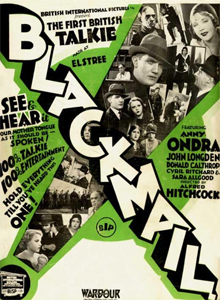“Blackmail” (1929) is one of the first British talkies, and that might’ve been exciting at the time, but it plays like modern 3D film when the viewer is burned out by 3D. The newfangled tech doesn’t hurt the film, but also doesn’t add anything.
Director Alfred Hitchcock (in a rare movie where he also has a writing credit, as he and Benn Levy adapt Charles Bennett’s play) shot “Blackmail” as a silent film but then added audio dialog scenes late in the process. This version is most readily available today, although an all-silent version was shown in theaters not yet equipped for sound.
Even the talkie version will reside in your head like a silent film because many scenes remain soundless (or with a score added after the fact), and the only sound in the dialog scenes is what the actors are saying. There are no sound effects. So someone will walk up the stairs without a sound, then speak audibly.

“Blackmail” (1929)
Director: Alfred Hitchcock
Writers: Charles Bennett (play), Alfred Hitchcock (adaptation), Benn W. Levy (dialog)
Stars: Anny Ondra, John Longden, Donald Calthrop
Interestingly, the film includes a credited score – by Jimmy Campbell and Reginald Connelly. This is different from many silent films, where the version we are watching had its entire score added much later for the home-video release.
Hitch’s hallmarks overcome gimmick
I was aware of these production oddities, and they would’ve been distracting in a lesser film. Thankfully, Hitchcock’s hallmarks are on display and smoothly deployed. We move from one suspenseful POV to another, but mostly we’re with the luminous Anny Ondra, whose Alice would have no chance in a poker match.
(SPOILERS FOLLOW.)
Midway through the film, she becomes a killer. She never verbally admits it, but it’s written all over her face from that point forward.
When we meet Alice, she’s planning on being disloyal to her stolid boyfriend, Scotland Yard detective Frank (John Longden), by dating suave artist Mr. Crewe (Cyril Ritchard). So we don’t particularly like her. Then comes “Blackmail’s” most famous/infamous scene, as Crewe tries to rape Alice and she stabs him to death in self-defense (in off-screen but stylized fashion, capped by a Hitchcockian shot of Crewe’s lifeless arm poking through a bed curtain).
The sequence is intense, awkward, unmotivated and unbelievable, but it pivots “Blackmail” toward a central theme that will resonate with 21st century socio-politics. Alice eventually tells Frank he wouldn’t be able to understand the situation she was in, a feminist viewpoint from Hitchcock that might surprise some.
A detective in a glass house
The director wrings additional suspense from the POV of Tracy (Donald Calthrop), who does the blackmail of the title (and hams it up to a level that matches the fear on Ondra’s face), having seen Frank hand a misplaced glove to Alice.
The phone booth is soundproof, but the walls are clear, making possible a sly commentary about the emergence of talkies. Hitchcock embraces the technology, but also reminds us that storytelling transcends the tech. (“Dial M for Murder” is a later example. He takes advantage of 3D but the story remains in the forefront.) Tracy’s warning to Frank that “Detectives in glass houses shouldn’t wave clues” is a pretty great line of dialog for Hitchcock’s first talkie.

Hitch switches our sympathies to the blackmailer when Frank thwarts Tracy’s threats with a counterthreat of exposing Tracy as the wanted criminal that he (conveniently, by the script) is. Symbolism such as the hatless Tracy running from respectable hat-wearing people ensues, and it culminates in a vertiginous finale atop the half-moon skylight of a museum – precursing “Saboteur,” “Vertigo” and “North by Northwest.”
“Blackmail” is a three-pronged character piece like “The Manxman,” as Hitch has us thinking about what is the morally right decision for Alice, for Frank, and for Tracy. The scenario drives them in different directions for different reasons – Alice unable to live with the secret (but also knowing she acted in self-defense), Frank wanting to protect Alice (but he’ll have to set aside his job’s ethics), and Tracy simply needing money to live on (but overplaying his hand).
(END OF SPOILERS.)
It’s a little awkward with its gimmick of being a silent film with tacked-on talkie elements. And it’s not as multi-layered nor as zesty as his later classics. But “Blackmail” is fascinating film-history homework and most of its entertainment value and thematic import has stood the near-century’s test of time.
RFMC’s Alfred Hitchcock series reviews works by the Master of Suspense, plus remakes and source material. Click here to visit our Hitchcock Zone.

